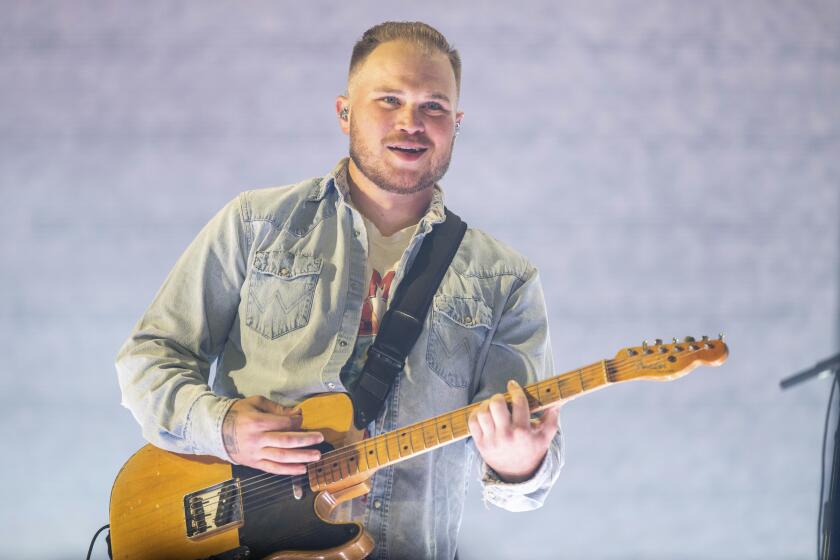Bend it like Beck
Beck’s rented recording studio is a tiny, vault-like cell set in the core of a Fairfax-area office building. It’s one of the last vestiges of a hotbed of musical production in the 1960s and ‘70s -- the headquarters of the ABC-Dunhill record label, where some seven studios hummed around the clock, turning out records by such hit makers as the Mamas and the Papas, Steppenwolf, Steely Dan, Dusty Springfield, Three Dog Night and more.
That history, and its burial in waves of redevelopment, has a real immediacy these days for Beck, a Los Angeles native whose music always has reflected the psychic and geographic contours of his hometown, a place where he’s suddenly feeling like a stranger.
“What do you think about how the city’s changing?” the 38-year-old musician asked on a recent evening, sitting in an Italian restaurant down the street from the studio. “It’s weird how we do that here. Before this decade it felt like the city sat still since about 1980. It seemed like there was a good 20 years where there was stuff left over. And then it feels like in the last five, six years, every time I’m driving down Wilshire or somewhere, half the block’s torn down, and all of a sudden there’s a building that wasn’t there two months ago.
“There’s all this cool stuff that’s just fading . . .,” he continued. “Ed Ruscha did a piece where he went and took photographs of every building on the Sunset Strip. I think it’s almost time to do that again.”
Or, maybe, make an album that conjures that sense of displacement. That wasn’t the goal when Beck started recording his newest collection, “Modern Guilt.” Going in, it was shaped by his recent immersion in obscure, exotic psych-rock records, by his desire to be economical and focus on electric guitar, and by his studio partnership with a new co-producer, Danger Mouse.
But when Beck gets to work, things tend to take on a life of their own. With the music forming as they went, and with many of the lyrics sprouting as last-minute improvisations, “Modern Guilt” took shape as a focused 30 minutes of less-is-more rock with a disquieting tone of alienation.
“I think I’m stranded, but I don’t know where,” he sings in “Orphans,” the first song they did. On the closing track, “Volcano,” he amplifies the feeling: “I’ve been walking on these streets so long I don’t know where they’re going to lead anymore.”
“We didn’t really have any discussions about it beforehand,” said Danger Mouse, who has hit the big time with Gnarls Barkley while also collaborating with such distinctive left-of-center artists as Gorillaz, the Black Keys and Sparklehorse. “We had kind of said, ‘Oh maybe we’ll do a minimal, kind of rocking, kind of stripped-down garage kind of thing,’ and this and that, but once we got into it, neither one of us could really concentrate on one thing. We just did whatever, and stuff would start changing and being different. It was very open.”
A darker direction
Beck agreed that the record strikes a different tone for him, but because of what’s missing rather than what’s present. “It doesn’t have a smiley face on it,” said the singer, who always has laced his songs -- even the dark ones -- with a surreal, crowd-pleasing humor, going all the way back to his 1993 breakthrough hit “Loser.”
“The imagery is coming out of whatever amalgamation of the Delta blues and Beat poetry and film and punk and the things that I grew up with,” he added. “It just doesn’t have the part of it that’s the punch line or the thing that’s winking at you. . . .”
Like his last two albums, “Guero” from 2005 and “The Information” from 2006, “Modern Guilt” has drawn favorable reviews, shaping up as another solid entry in the body of work that Beck has been building in the quieter aftermath of his moment at the center of the pop universe with “Odelay” in the mid-’90s.
Sales have been decreasing, but the lower profile seems to suit Beck, who’s been married for four years to actress Marissa Ribisi and is the father of two children, ages 4 and 1. He might be feeling a psychic displacement, but he was relaxed and talkative as he grazed on a mozzarella salad in the restaurant.
Just back from a tour of Europe, he was looking forward to a set of U.S. dates with his new band -- they’ll be at the Hollywood Bowl on Saturday, accompanied by the Hollywood Bowl Orchestra strings conducted by his father, arranger David Campbell.
He was also in a mood to reminisce about his younger days in Los Angeles -- escaping from his family’s small, overpopulated apartment near MacArthur Park to work odd jobs, hang around for some informal education at Los Angeles City College and spend days at the Central Library. There he discovered the blues recordings and books of Beat poetry that would inspire him to make music.
As he talked about the growing sense of dislocation, he pointed out that it applies on a larger scale as well. “I was kind of trying to figure out what the song ‘Orphans’ was about,” he said. “And in a way I was thinking how there’s a large segment of this country -- we’re part of this country, we’re taxpayers, we grew up here, the country is in our blood. But certain things have veered so off course, or in a direction that people can’t identify with or don’t agree with, you can’t help but feeling slightly orphaned in your own country.
“I’m very curious to see where it’s going,” he continued. “If that pendulum swings I’m going to be hanging on to it. I’m going to ride it all the way to the other side. I’m hoping that’s what happens.”
More to Read
The biggest entertainment stories
Get our big stories about Hollywood, film, television, music, arts, culture and more right in your inbox as soon as they publish.
You may occasionally receive promotional content from the Los Angeles Times.










